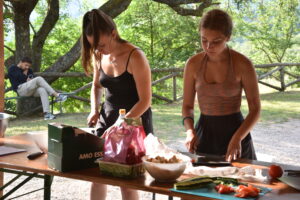This is a nationwide programme with hundreds of kindergartens and schools have registered to participate.
Participation in the Really Healthy School and Kindergarten program brings benefits:
It enriches the school’s educational program with new educational and educational elements and project teaching and helps to fulfill the educational field of Health Education and the cross-cutting theme of environmental education.
87% of participating schools say that the activities of the Skuteč zdravá škola program help children and pupils to acquire the competences needed for an active civic, professional and personal life.
97% of participating schools say that the Really Healthy School program helps students develop new skills, values and attitudes that will lead to more sustainable societies.
Pro pedagogy:
It creates opportunities and possibilities for using experiential and project-based forms of learning and enriching teaching with a new topic – food.
It will help you fulfill the cross-cutting topic of environmental education.
Lots of new methodological materials available for free.
39% of the participating schools definitely agree and 51% rather agree with the statement that the implementation of the Really Healthy School program enables the introduction and use of experience-oriented pedagogical procedures, the active involvement of pupils in the educational process and participation and cooperation.
34% of the participating schools think that the implementation of the Really Healthy School program certainly enables the introduction and use of pedagogical procedures oriented towards teaching outside the school, in contact with the real world, 61% of the schools think that rather yes.
This is a nationwide programme that could not be replicated as a whole in an individual school or training institution. Moreover, it requires the participation of the entire school staff including kitchen or canteen workers making it more complex to be implemented. Finally, it involves the active engagement of the entire regional economy since it dictates that “school canteens buy raw materials from local farmers, grocers and distributors, which is not always easy to achieve.



